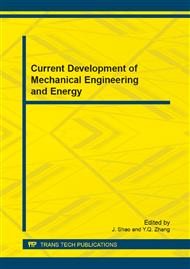p.24
p.28
p.32
p.38
p.42
p.47
p.51
p.55
p.59
A Study on Brake Noise Using the Complex Modal Analysis Method
Abstract:
The paper analyzed the influence of the friction factor theoretically on the brake system to produce noise, through complex modal analysis method, established the finite element model of air disc brake to analyze and forecast the brake noise and get brake noises frequency on a certain test conditions. Through the analysis of multiple sets of brake noise under different friction coefficient, it is concluded that the increase of friction coefficient has a promoting effect on brake noise.
Info:
Periodical:
Pages:
42-46
Citation:
Online since:
February 2014
Authors:
Keywords:
Price:
Сopyright:
© 2014 Trans Tech Publications Ltd. All Rights Reserved
Share:
Citation:


